
Kababa Alemu's feet pound the wet soil as he rounds a makeshift track for the 10th time.
It's a Saturday afternoon in the village of Kersa Elala, in western Ethiopia, and dozens of townspeople, returning from church services, have stopped on the side of the road to watch the 20-year-old runner as he races around the muddy loop.
The winner of a prestigious regional race and a top finisher in several others, including the famed Great Run in the capital of Addis Ababa, Kababa is the star runner in his village.
But he is one of many in this county. One of thousands in this region.
One of tens of thousands in this nation.
They all share the same dreams: A future free of poverty. A chance to help themselves, their families, their villages.
And so they run.
Through rain and mud. Over broken terrain. Sometimes without shoes. At sunrise and sunset. They run.
The promise and hope for a better future usually begin in a small village like Kachama Wellesu, where Kababa was raised alongside eight brothers and sisters. In places like this, rural and remote as they come, caring for family members and tending the farm take priority over everything else.
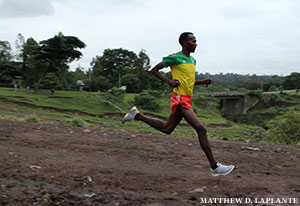
Most Ethiopian athletes begin running shortly after they can walk and many are training in earnest by the time they are 10. But Kababa hadn't considered running for sport until he was about 15 years old and stopped, awestruck, as a group of local runners sprinted past his farm.
"I have to do that," he thought.
Since that moment, Kababa has been in training, waking early to run before work and sacrificing sleep -- and safety on Ethiopia's unlit roads -- to run late into the evening.
He won his first race, a regional 5K in North Shawa, against scores of other runners, many with better shoes and better training. With a few more wins, he knew, he might attract the attention of a scout from one of Ethiopia's athletic clubs, which offer professional salaries to the best runners in a nation full of great runners.
"I would be able to move my family and pay for my siblings to go to school," Kababa says.
But his is a dream shared by so many others.
"Unfortunately the odds aren't good," says Joseph Kibur, who founded Yaya Village, a training center for runners north of the poverty-stricken capital. "It's reality. If you count the number of Ethiopians who run versus the number of people who make it -- the numbers are small."
And the gamble can be costly. As he pushed to better his physical abilities, Kababa realized his dream was coming at a cost to his family, which was struggling to meet the young runner's caloric needs and simply couldn’t afford to outfit him with good running shoes.
So when Kababa was approached in the days after the race by a man promising the chance he’d been dreaming of, the desperate young athlete was eager to sign on.
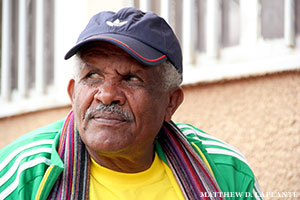
Debele Yami's belly leads the way as the rotund track manager strolls the streets of Assela in an Adidas tracksuit, matching hat and shoes.
It's a Friday afternoon and Debele (at right) hunts for young athletes like Kababa.
There are several paths to professionalism for runners in Ethiopia.
One way that is gaining popularity is training under a private manager. When he finds a promising young athlete, Debele funds his rent, food and race entrance fees. When a runner is successful consistently, he gets noticed by private and government-sponsored clubs, mostly centered in and around Addis.
"These are runners who come from very small villages and when they join clubs, they get a salary," Debele said.
Under contract, a runner can make a few hundred dollars each month.
For Debele's troubles, he takes a small commission. He has managed 12 runners, all of whom are now under contract.
Kababa had heard of managers like Debele, but with limited schooling and no experience in the world of professional sports representation, he didn’t know that above-the-board managers take a commission after
their runners win a salary, not before. So when a man approached him after the North Shawa race and offered an opportunity to run professionally in Japan -- along with enough money to care for his family -- Kababa was elated.
One obstacle: The man wanted 5,000 birr -- about $275 -- for transportation and a passport. Kababa went to his parents with the news. Overjoyed by the opportunity they agreed to sell an ox and cow -- two of the six animals they owned -- to pay the fee, reasoning that Kababa would be able to pay back the loan shortly after arriving in Japan.
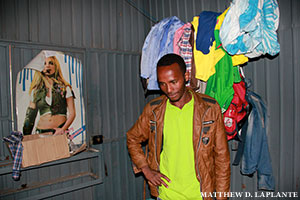
Today, Kababa knows that he was naive, but he's always understood that no opportunity comes without sacrifice. "I heard of some individuals getting sponsored privately and when I heard that, I gave him money,"
he says.
During the next few days Kababa received messages from his would-be manager requesting 10,000 additional birr. But the man himself had disappeared.
"I knew he was a bad man when he was not willing to come to me," Kababa says.
There would, he realized, be no money to repay his parents. The new farming season was upon them, "and they had sold their only ox, so they could not plow the field."
Ashamed and heartbroken over his loss, he fled to Kersa, where he found himself on the doorstep of Tariku Gebre.
Many in Kersa have not completed high school, let alone college. But Tariku always excelled in school and, following his university graduation, returned to his home village to assume two jobs with non-governmental organizations and run a small soda shop along the two-lane road that runs through his town.
In a village where many families still live in mud-floored huts, Tariku owns a comfortable brick home, with a bumpy linoleum floor and a small satellite-linked television.
Tariku looked into Kababa's desperate eyes as the 19-year-old runner explained his need for support. He needed a place to sleep, some food to eat and a chance to compete. And he needed it not for himself, he said, but for the family and village he had left behind.
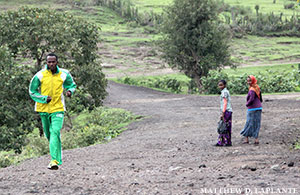
Though he is notably better off than many of his fellow villagers, Tariku had little to offer the young man. Still, he could not turn Kababa away.
"I have to support him and he has to live with me," Tariku decided.
Tariku made a room for Kababa in the storage area of his tin-shack soda shop and invited him to share humble meals of injera, shero and watt.
That's an important start. Kibur, the Yaya Village founder, says most Ethiopian runners are not properly nourished.
And yet Kibur, who set a continental record in 1988 as a high school runner in Toronto, notes that his 1,500 meter time -- 3 minutes and 45 seconds -- wouldn't garner any attention in Ethiopia.
"If they can do so much with so little," he says. "You can only imagine."
A year has passed since Kababa arrived in Kersa. He still trains on the makeshift track across the road from Tariku's home, kicking up dirt and rocks as he flies past the dozens of villagers who gather to chat and watch the local star.
In rain and fog, through mud or under the blistering sun, he runs.
Though his shoes are in need of repair, the stitching now unraveled, he runs.
It's in his blood.
Ethiopia first gained international attention for its running prowess at the 1960 Olympics in Rome, where Abebe Bikila won the marathon -- running barefoot a half-century before it was fashionable. Since then the country has dominated running competitions across the globe. In the past three Olympics Ethiopians won 22 medals -- 10 of them gold.
Among the nation's greatest heroes is Haile Gebrselassie, the prodigious distance runner who at one time held 27 world records.

Athletes like Haile have inspired a cult of running every bit as important to Ethiopia's cultural identity as its pancake-like food staple, injera. It can be seen every morning in Addis at Meskel Square, where people from across the city gather with a single, common goal -- to run.
Addisu Setargie doesn't run for money, he runs for pure enjoyment -- doing laps on the muddy tiered track, below a giant billboard featuring Haile, now a national spokesman for Ambo mineral water.
Addisu likes Haile, but another runner has his heart. "Kenenisa is my favorite," Addisu says of Kenenisa Bekele, a reigning Olympic champion who is representing Ethiopia in London. "He is my role model."
Abebe, Haile, Kenenisa and nearly all of the rest of Ethiopia's running stars have one thing in common: They all came from impoverished backgrounds.
Kibur likens Ethiopia's love for running to the American relationship with basketball. For most Americans, he says, basketball is entertainment. For many young people from poor urban communities, though, it's like "dreaming of going to the NBA."
And for a nation that is among the most culturally, religiously, ethnically and economically diverse in the world -- a nation that has not had a peaceful transition of power in its modern history -- star runners provide a unifying inspiration.
Kumera Bekele Benti (below, at right) walks past four empty, weather-ridden buildings that make up the government-sponsored training facility for runners in the southern Ethiopian city of Assela. The grounds are like a ghost town now, but 250 athletes have trained here full-time the past three years, a period that ended in the run-up to the Summer Olympic Games.
The next time these grounds will be this empty will be during the 2016 Olympics in Brazil, and Kumera, an assistant coach in his third year at the facility, is enjoying this short respite from the all-encompassing regimen.
As evidence of the incredible difficulty of making the nation's prestigious Olympic team, none of the institute's young runners -- generally between the ages 18 and 20 years old — made the 2012 Olympic team.

But 180 of them were picked up by private or government-sponsored athletic clubs. So although they are not Olympians, they are earning a salary -- money to pay for a home, and provide for the families they have left behind in their villages.
About 60 of the runners have been given the option to return to the facility for the next training cycle. That leaves just under 200 spots for the vast number of runners who will compete for the opportunity to live and train in Assela.
As he travels the countryside searching for Ethiopia's next generation of star runners, Kumera says he is constantly reminded of their desperation.
"Most athletes are poor," he says. "If you are rich, you don’t need to be an athlete."
When runners fail to make the cut, Kumera says, they are often anguished.
"We have to use psychology," he says. "We say 'You will have another opportunity. This is not the end of your life.'"
But coming from such destitution and despair, and having sacrificed so much in hopes of the opportunity, some can simply not imagine what life will look like if they do not succeed.
For women runners, the stakes are especially high.
Theoretically, he says, running in Ethiopia provides an equal opportunity for men and women to escape poverty, "but in reality there is pressure on women to take care of their family."
Several years ago he discovered a promising young runner who was working as a maid and, he says, being abused by her employer.
"She didn’t make it to the Olympics, but she went to Spain and got hired by a professional club," he says.
Hoping to spark similar stories, Yaya Village is holding a competition to give four young women -- specifically those lacking other opportunities — a chance to train full-time at the facility.
"My hope," he says, "is to get four female athletes to Brazil."
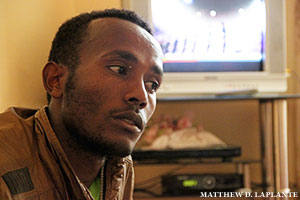
Kababa sees limited opportunities to escape the grip of poverty. "The two chances I have are to keep on training and change my life or go to school," he says.
Tariku sees hope in either path.
"He is a good student and very smart," Tariku says. "He is second in his class."
But he is also far behind, having only recently completed the seventh grade. And even if he catches up, education alone is not enough for an Ethiopian to make a living wage. Ethiopia's unemployment rate is a debilitating 21 percent, according to the London-based Legatum Institute. It is not uncommon to find college educated individuals working in low-wage, low-skill jobs because they cannot find work in their field.
That, Kababa knows, makes running his best bet -- even if it is against long odds.
In his last competition -- an Addis 5K open known as The Great Race -- Kababa placed 15th out of 700 runners, more than half of whom came from training centers and clubs. His time in the race, just over 14 minutes, would qualify him for the Olympics in many other nations.
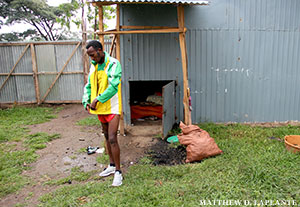
But few sponsors or scouts were there to see Kababa's performance. The Great Race is a fund-raiser for a dam project intended to produce more electricity for southern Ethiopia and not an official competition.
But the run provided an opportunity for Kababa to assess his progress.
He has slashed two minutes off his 5K time in the past two years. Tariku, his coach, local sponsor and biggest supporter, whole-heartedly believes Kababa can reach his goal so long as he keeps
competing.
But that comes at a price. The journey from Kersa to Addis, where many races are held, can take a day or longer by Ethiopia's notoriously unreliable public transportation. Hotels and healthy food -- the kinds that winning runners need consistently, not just occasionally -- are expensive in Addis. But he is not discouraged. And even in his darkest times, Kababa has remained focused on his goal.

The man who took his passport and his family's money, Kababa says, is just a hurdle in the race out of poverty.
"One day I will be a good person, a good runner and that guy will see me as world class," he says. "So I should not be frustrated because the future is bright."
And so Kababa's feet pound the wet soil. He rounds the track for the 10th time. The 11th time. The 12th time.
It's a Saturday afternoon in the village of Kersa Elala, and Kababa runs.
And runs.
And runs.
-- Danielle Manley is a freelance writer based in Utah.








